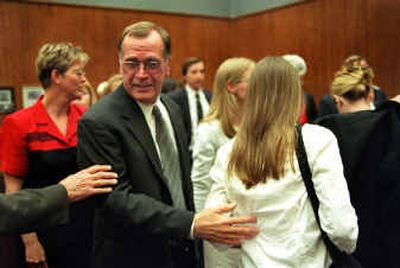Eastern Washington’s top federal prosecutor, an ex-POW, retires

Jim Shively, who has battled and beaten adversity throughout his legendlike life, is retiring as a top federal prosecutor for Eastern Washington.
Shively wanted to slip into retirement this month without any hullabaloo or ceremony, but friends and colleagues wouldn’t stand for that.
The first assistant U.S. attorney for the Eastern District of Washington, who served as acting U.S. attorney from 2000 to 2001, was honored by his friends, family and colleagues at a private reception Thursday afternoon.
Such attention isn’t comfortable for Shively, known in legal circles for his modesty, even-handedness and unflappable nature. He is more accustomed to speaking to high school students on Veterans Day or encouraging young people to avoid the pitfalls of drugs.
Shively was tortured and held as a prisoner of war for six years during the Vietnam War.
Shortly after his return, his parents died. Then his war medals were destroyed along with his family home when the firestorm of 1991 swept through Spokane Valley, about the same time his only sister died. For the past three years, Shively has battled cancer.
Still, the 62-year-old war hero and prosecutor is never pessimistic or overcome by those obstacles, and usually adds a laugh to anything he has to say, his admiring associates say.
“I really don’t have a secret,” Shively said Wednesday with one of his chuckles when asked about his upbeat attitude toward life.
“Jim’s motto is, ‘Don’t sweat the small stuff, and it’s all small stuff,’ ” Assistant U.S. Attorney Pam DeRusha said. “He lives every day of this life by this motto.”
Born in Wheeler City, Texas, Shively moved to the Spokane Valley with his parents, Harold and Clara Shively, when he was 5. He attended Dishman Elementary before graduating in 1960 from West Valley High School, where he was a student leader.
He attended the U.S. Air Force Academy and graduated in 1964 with a degree in civil engineering. He earned a master’s degree in international relations from Georgetown University.
He went on to become an Air Force pilot, assigned in December 1966 to fly F-105 jets at Ta Khli Royal Thai Air Base in Thailand as part of the U.S. forces engaged in the Vietnam War.
Six months after his deployment, his F-105 was shot down over North Vietnam on May 5, 1967. He ejected, and landed in a rice paddy 20 miles from Hanoi.
Taken prisoner, Shively was paraded through the streets of Hanoi before undergoing weeks of interrogation and harsh treatment. He was held in the infamous “Hanoi Hilton” before finally being released by the North Vietnamese on Feb. 18, 1973.
“I’m not resentful, and I don’t look on it as a real loss, but an experience from which I learned a lot,” Shively said a month after his release.
The ex-POW attended Gonzaga Law School and became a lawyer in 1977. After six years in private practice, he became a prosecutor for the Department of Justice in 1984, working at the U.S. attorney’s office in Spokane.
He handled criminal prosecutions and also defended the U.S. government in assorted civil suits. In 1994 he was named civil chief in the U.S. attorney’s office and later became a staff evaluator.
“He has been both a friend and a mentor to me,” said U.S. Attorney Jim McDevitt. “Nothing upsets or unnerves Jim. He has always been rock solid and has provided this office with leadership and sound counsel for the past 20 years.”
U.S. District Court Judge Fred Van Sickle said the district’s federal judges hold Shively “in very high regard. He is an excellent attorney and a man of great integrity.”
Such attention is one of the few things that seem to rattle Shively, whose replacement has not yet been named.
“All those people there in that office, they’re the greatest people in the world to work with, every one of them,” he said.
Now Shively spends time reading, something he couldn’t do as a POW, and visiting with two grandchildren.
“I could have died that day over North Vietnam, but for some reason, I didn’t,” he said. “Any day after that is a good day.”